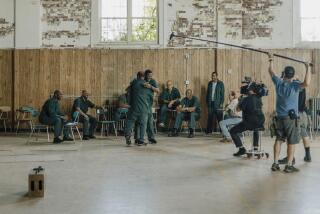Going Through the Years in ‘Voice’ and ‘Flirting’ : Movies: Writer-director John Duigan’s trilogy tackles the formative years of growing up in a small Australian town.
LONDON — Writer-directors, the true auteurs of the film business, are an endangered species these days. Fewer and fewer wield the power simply to make films straight from their own scripts, with no interference.
And even in the rarefied company of those who do, how many enjoy the artistic freedom to make a trilogy of highly personal movies?
John Duigan’s probably the only one.
One of Australia’s most respected directors, Duigan, 43, has been working on his trilogy for more than five years. The second of the three films, “Flirting,” a charming, comic, touching piece about a teen-age boy, opened in Los Angeles last week distributed by Goldwyn. It won awards from both Australia’s film industry and movie critics on its release last year, and was later warmly received in Britain.
The trilogy tackles the formative years of Danny, a bookish, non-conforming boy raised in a small Australian town. In “Flirting,” Danny suffers the oppressive atmosphere and rigid discipline of his boys-only boarding school. Across the river is a girls’ school run on similar lines; among its students is a Ugandan girl, Thandiwe, living in Australia for a year while her father, an academic African nationalist, lectures. The relationship between Danny and Thandiwe ripens despite attempts by the schools’ authorities to break it.
Autobiography? Not so, insists Duigan: “I use Danny’s character as a way of expressing the evolution of some of my ideas. But it’s only loosely based on my experiences.” In fact, Duigan did attend an Australian boarding school like Danny’s, and as he tells it, “was able to speak to many painful memories that I had, because I loathed my time there.”
One example concerns a scene in which girls from the neighboring school are transported to Danny’s school to attend a dance, heavily chaperoned by teachers. Danny has already made hasty plans to partner Thandiwe at the dance, but after a minor infringement of discipline, is forbidden to go.
“It happened,” Duigan says with a sigh. “A teacher who will do that is carrying spitefulness to the extreme. He’s not only hurting you but also the innocent party, the girl who’s been stood up.”
The predecessor to “Flirting,” the 1987 film “The Year My Voice Broke,” also drew on strands of Duigan’s life. In it, Danny was about 13 and smitten with Freya, a teen-age girl living in the same sleepy country town in the early ‘60s. She is adopted; her real mother was a woman of ill-repute who lived alone on the edge of town. It is even hinted that Danny’s father may be hers too. After becoming involved with a local delinquent, she decides to quit the town, with its gossip and narrow-minded prejudices, leaving Danny sad but now envisaging a world outside the small one he knows.
“I didn’t grow up in a small town like that,” Duigan offers. “I was born in England, where I lived until I was 10. Then came a couple of years in Malaysia before my parents moved to Australia. My dad was in the air force, so I was a military brat. After he retired, he went to live in a country town, and I used to get jobs working on farms, so I know about that life.”
Duigan, who is serious, with a slightly disheveled appearance, thinks long and hard before answering questions. His sense of humor is dry to the extent that his witty asides take a while to sink in. He currently lives in London, purely because he finds it a stimulating city, and rents a flat near the Thames in the Chelsea district. One of his main preoccupations at present is the degree to which American audiences will embrace “Flirting.”
“They won’t accept films that don’t have Americans in them,” he notes. “Very few films do as well as their own. So non-American films need all the help they can get, from reviews and word of mouth. If only that first wave of an audience can be persuaded to see it, that’s the main thing. Audiences have a good time with the film, if they go to see it. Almost nobody doesn’t respond to the characters. They’re charming.”
Duigan adds that “The Year My Voice Broke” performed well on the U.S. art-house circuit, but failed to reach a mass audience. He has higher hopes for “Flirting,” in part because Goldwyn is expert in handling smaller films that straddle the art-house and mainstream categories.
“Flirting” cost less than $2 million, but oddly has a bona fide Hollywood star as a supporting player--Nicole Kidman, who portrays the head girl at Thandiwe’s school. “I’d worked with Nicole before, the first time when she did a children’s TV series in Australia with me when she was 16,” says Duigan. “I showed her the script, told her it would be the last time she would ever be playing a schoolgirl, and I was delighted when she agreed to do it.”
In “Flirting” and “The Year My Voice Broke,” Danny is played by Australian actor Noah Taylor, who will reprise his role in the third part of the trilogy, which Duigan aims to make in 1994. “Noah is 21 now, but he’s youthful looking,” says Duigan. “He’s a couple of years older than he looks. By the time the third film comes up, he’ll look the age he’s playing.”
Also available will be his Thandiwe--British-based actress Thandie Newton, who has a Zimbabwean mother and an English father, and who is currently studying anthropology and archeology at Cambridge University. “Noah and Thandie are actors who can take the audience into their world,” says Duigan.
He also notes that “Flirting,” on the surface at least, is in a genre familiar to Americans: a coming-of-age or rites-of-passage movie. Certainly it tackles the painful process of adolescence and has a central romance, as did “The Year My Voice Broke”; but the films also critique uniformity, racism, prejudice, sexism and intellectual torpor. “There’s a lot of layers in there for people who want to seek them out,” he observes.
Another difference between “Flirting” and most American movies about teen-agers is that Duigan’s adolescents are quirky, individual, complex and above all intelligent. Danny has two major heroes: One is boxer Muhammad Ali, but the other is French existentialist philosopher and writer Jean-Paul Sartre, whose work he reads voraciously.
“I think the characters, and not just the leads, are probably more developed than their corresponding characters would be in American films,” Duigan says.
“For instance, Nicole Kidman’s character takes a substantial journey. She’s much admired by everybody, and thought to have beauty, brains, everything. Yet she’s probably lonelier than anyone in the whole (film). And she sees in these two people (Danny and Thandiwe) a freedom and a spiritedness which attracts her and shows her the limitations of her ways.”
Duigan has been making his trilogy of films under the umbrella of the Australian production company Kennedy Miller. It is ironic, given the nature of Duigan’s low-key, wry, understated work, that Kennedy Miller is best known for a very different trilogy of its own--the violent, action-packed, stunt-filled “Mad Max” films, all directed by George Miller.
“They (Kennedy Miller) offer suggestions about the script before shooting starts,” Duigan says. “Once the film goes into production they give me a great amount of space. Then they come in late in the editing period, which is great, because by then I’m getting a bit stale. I’ve learned from them the discipline of tightening a script further than I might have pushed myself to do before. And again in editing, making some harder decisions than I might do, left to my own devices.”
After leaving Melbourne University, Duigan acted in experimental theater groups. Then, from 1975, he directed seven Australian feature films (scripting all but one) until “The Year My Voice Broke.” He also made one American movie--”Romero,” starring Raul Julia as the Salvadoran archbishop who became an eloquent defender of his people’s human rights. Now he hopes to make another for Goldwyn--a script called “Funny Peculiar” by June Roberts (“Mermaids”), about a group of people with various mental illnesses living in a halfway house.
At the end of “The Year My Voice Broke,” Danny was left contemplating that there was more to life than the boundaries of his small town. At the end of “Flirting,” he comes to the same conclusion about Australia. So what’s to become of Danny in the third part of the trilogy?
“It’s set in Paris in 1968,” Duigan says. “Thandiwe’s there, studying at the Sorbonne. We see Danny getting into larger issues like politics, philosophy and racism, considering places that up to now he’s only seen on stamps.”
And maybe he’ll get to meet Jean-Paul Sartre?
“Maybe,” says John Duigan.
More to Read
Only good movies
Get the Indie Focus newsletter, Mark Olsen's weekly guide to the world of cinema.
You may occasionally receive promotional content from the Los Angeles Times.










